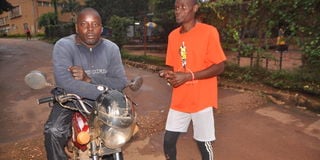In search of Ugandan dream 35 years later

Samson Sosolo (L) and Abdul Karim are 35 years old, as old as the leadership of President Yoweri Museveni. PHOTO/Stephen Otage
What you need to know:
Two men, born in different settings, in 1986, narrate their experience of growing up in Uganda over the 35 years of NRM rule. While they have some education, unemployment remains a big concern and survival is hard on today’s wages and limited opportunities.
Samson Sosolo was born on July 29, 1986. Sosolo’s father, David Jatu, 62, a fish monger from Nangala Parish, Nawaikoke Sub-county, took his expectant mother Monica Nairuba, 51, on a bicycle to deliver him in Nawaikoke Health Centre III, nine miles away in then Kamuli District, now Kaliro District.
Sosolo joined Primary One in Nangala Primary School in 1995 at the age of nine, without going through nursery school.
He walked four kilometres every day to the school where classes started at 8am and ended at 2pm. The school did not serve meals. He packed boiled sweet potatoes to school, sometimes ripe mangoes, boiled or roasted maize which he ate for lunch. The school fees at the time was Shs3, 350 which he paid between Primary One and Primary Three before Universal Primary Education (UPE) was ushered in.
Arrival of UPE
When UPE was introduced in 1997, his parents stopped paying school fees but bought uniforms, stationery and other scholastic materials. His school started asking parents to contribute three kilogrammes of maize and Shs1, 000 per term for milling maize to prepare for them porridge for lunch. The porridge did not have milk or sugar.
In 2001, he sat his primary leaving exams and scored 30 aggregates in third division. He joined Irundu Modern SSS in Senior One in the new Buyende District. His tuition was Shs25, 000 per term. He rode a bicycle six kilometres to the private school before joining Kaliro High School in 2003 which was government-aided and better equipped. This is where he sat his O-Levels, scoring aggregate 32 in 2005.
Sosolo sat out the year 2006 because his father could not afford his tuition at the Pioneer Technical Institute where he hoped to achieve his dream of becoming a mechanical engineer.
He was enrolled for Motor Vehicle Engineering Craft One certificate and in 2009, he got a job in Mukwano industries as a casual maintenance mechanic, earning a monthly salary of Shs120, 000.
In 2013, he joined Lugogo Vocational Training Institute for the Craft II certificate which enhanced his salary to Shs400, 000. He took advantage of the salary enhancement to buy himself a boda boda, which he would use to make money when he was not working, to supplement his income.
However, even as a single man, he was demotivated by the way his salary was being paid. Sometimes he would be paid for 10 days and yet he had worked for the entire month, which forced him to look for another job in a Chinese factory in Namanve Industrial area, which closed after one year because they lacked market for the plastics they were producing. A friend of his took him to another factory in Komamboga which was producing plastics, but closed down.
In 2017, he got a girlfriend, with whom he had a baby girl who is now two and half years old. His family is paying monthly rent of Shs130, 000 for a two-roomed house in Nabweru, a city suburb. Asked what he thinks about the only regime he has seen in his life, he says from what his parents have told him about past regimes, NRM seems to have done well with peace and security but his biggest challenge is the unemployment.
“Investors are here claiming to employ us and yet they are cheating us. Where I worked in Komamboga, the Chinese were not paying salary but they wanted to pay us cash for the days worked,” he said.
The father of one adds that unlike his father who was able to feed, clothe and pay school fees for all his nine siblings, he finds life too expensive these days because every day he has to part with Shs10, 000 to feed the family and once in a while, between Shs30, 000 and Shs60, 000 for medical bills when the family members fall sick. He says unlike when they were growing up, food was readily available from the garden but today, everything has to be bought with money.
Abdul Karim
Abdul Karim was born on March 1, 1986, a month after the NRA took over, following a five-year armed rebellion. He has grown up without his parents, having been abandoned at eight months after he was burnt in Gulu Barracks where both his parents were soldiers.
Following the accident in which his hand was crippled, his mother Oliver Night, a Mukonjo from Bundibugyo District, picked him from Gulu barracks and took him to his grandmother who raised him in Semuto Kapeeka.
Since both parents were soldiers, in 1996, his grandmother took him to Kijaguzo Primary School in the current day Nakaseke District, formerly Luwero District, which was offering free education to children of army veterans. Here, he sat Primary Leaving exams in 2002, scoring 29 aggregates. He later joined Kitovu Technical School in Masaka District where he was admitted to pursue a course in carpentry and tailoring based on his talent as an athlete.
Owing to his disability, he could not continue with the tailoring and carpentry work so he opted out of the school. He thought as an athlete, he would concentrate of developing his talent but no one ever took note of his talent and in 2007, he started hawking toothbrushes, handkerchiefs around Nabweru trading centre. In 2009, a friend advised him to go to Owino market to usher clients towards used clothes stalls, which would earn him better money.
However, in 2010, he decided that doing business, would not enable him achieve his goals as an aspiring athlete. He decided to return to Luweero to engage in farming which was also tedious for him because he could not handle the hoe with both hands. Although he has heard from several sources that his father Major Mohhamed Yiga, is working in Kakiri Barracks as a soldier, he has never bothered to go and look for him. However, his grandmother, always told him his biological mother is a retired soldier living in Amuria District. In 2014, he went to Amuria in search of his mother.
“I grew up not knowing my mother but in 2014, I went to find out what happened and she told me that I am her first born. She produced nine other children in Teso. When I was eight months old, a candle burnt my hand and I was taken for treatment after which she took me to grandmother to look after me,” recalls Karim.
Faced with the stark reality, he decided that concentrating on athletics was his best bet. He used to jump onto trucks headed to Kampala from Luweero District to participate in track and field events hoping that one day, someone would identify his gift and take him on.
In 2014 and 2015, he participated in the Makerere University marathons first taking part in the 21kms race and 10,000kms in 2015. That year, he also participated in the Mubende Catholic Church fundraising marathon where gold medallist Dorcus Inzikuru and Moses Asunja from the Uganda Athletics Federation, identified him and asked him to participate in the national trial at Namboole Stadium.
Since then, the Uganda Paralympics Committee signed him up to run among the disabled athletes. Through that opening, Abdul Karim teamed up with Joshua Njagalo, the head of the Makerere University athletics team and his colleague Ngobi Allan, both university students.
The two are helping Karim to stay afloat. Karim revealed that he and his teammates sleep in a locker room on the university sports ground, where the sports uniforms should be stored. The rooms are allocated to the students as residential quarters. He hopes that one day, an individual or company will be able to appreciate his talent and sign him up for a big deal.




